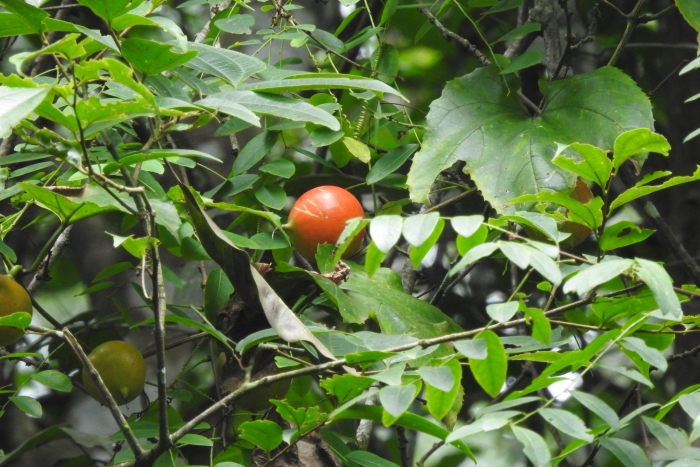Bitter Snake Gourd
(Trichosanthes tricuspidata)
Bitter Snake Gourd (Trichosanthes tricuspidata)
/
/

© Srinivasan Kasinathan
CC BY 4.0
Image By:
© Srinivasan Kasinathan
Recorded By:
Copyright:
CC BY 4.0
Copyright Notice:
Photo by: © Srinivasan Kasinathan | License Type: CC BY 4.0 | License URL: http://creativecommons.org/licenses/by/4.0/ | Uploader: srinivasan2 | Publisher: iNaturalist |




















Estimated Native Range
Summary
Trichosanthes tricuspidata, commonly known as Bitter Snake Gourd, is a perennial climbing vine native to tropical Asia, including India, Sri Lanka, and parts of China. It thrives in a variety of habitats, such as forest edges, open woodlands, and thickets. The plant can reach lengths of over 4 meters, with a distinctive appearance characterized by its slender stems, large lobed leaves, and white or yellowish flowers that bloom in the summer. The flowers are nocturnal and fragrant, attracting pollinators such as bats and moths. Bitter Snake Gourd produces elongated fruits that turn red when ripe and are covered in sharp trichomes or spines.
Bitter Snake Gourd is valued for its ornamental flowers and unique fruit, which can add interest to garden trellises or arbors. It is also used in traditional medicine and as a vegetable in some cultures, although the fruit is very bitter. In cultivation, it prefers warm temperatures, high humidity, and well-drained soil with organic matter. It requires a sturdy support structure to climb on and benefits from regular watering, especially during dry periods. While it can be grown in part shade, it flowers best in full sun. Gardeners should be aware that it can become invasive outside its native range due to its vigorous growth and ability to self-seed.CC BY-SA 4.0
Bitter Snake Gourd is valued for its ornamental flowers and unique fruit, which can add interest to garden trellises or arbors. It is also used in traditional medicine and as a vegetable in some cultures, although the fruit is very bitter. In cultivation, it prefers warm temperatures, high humidity, and well-drained soil with organic matter. It requires a sturdy support structure to climb on and benefits from regular watering, especially during dry periods. While it can be grown in part shade, it flowers best in full sun. Gardeners should be aware that it can become invasive outside its native range due to its vigorous growth and ability to self-seed.CC BY-SA 4.0
Plant Description
- Plant Type: Vine
- Height: 10-15 feet
- Width: 6-10 feet
- Growth Rate: Rapid
- Flower Color: White
- Flowering Season: Summer
- Leaf Retention:
Growth Requirements
- Sun: Full Sun, Part Shade
- Water: Medium
- Drainage: Medium
Common Uses
Edible*Disclaimer: Easyscape's listed plant edibility is for informational use. Always verify the safety and proper identification of any plant before consumption., Showy Flowers
Natural Habitat
Tropical Asia, including forest edges, open woodlands, and thickets
Other Names
Common Names:
Scientific Names: , Trichosanthes tricuspidata, Trichosanthes bracteata var. tomentosa, Trichosanthes cordata, Trichosanthes cucumerina, Trichosanthes puber,
GBIF Accepted Name: